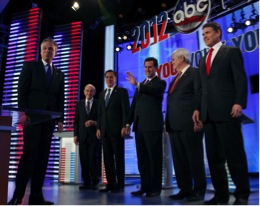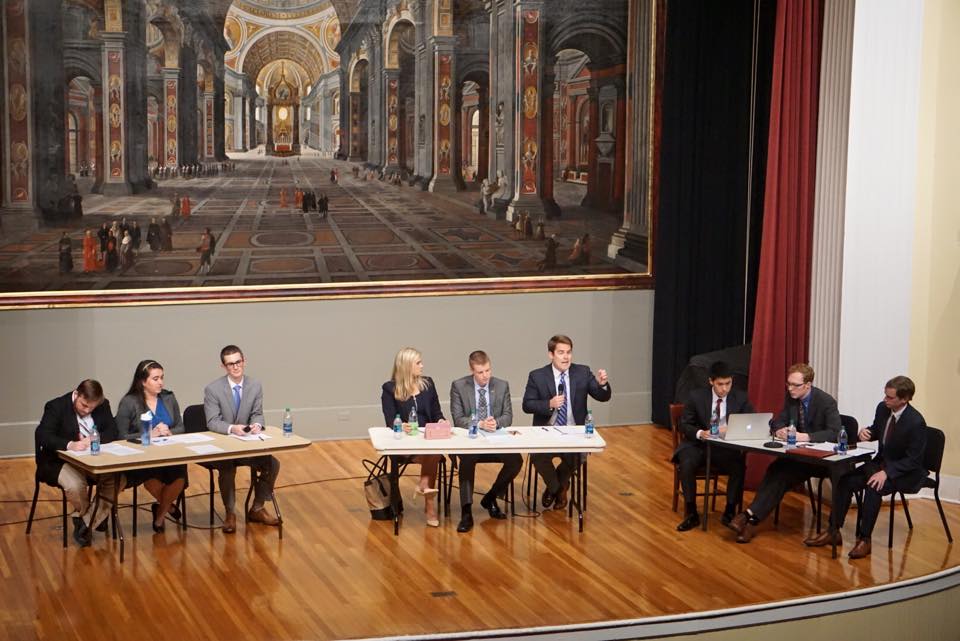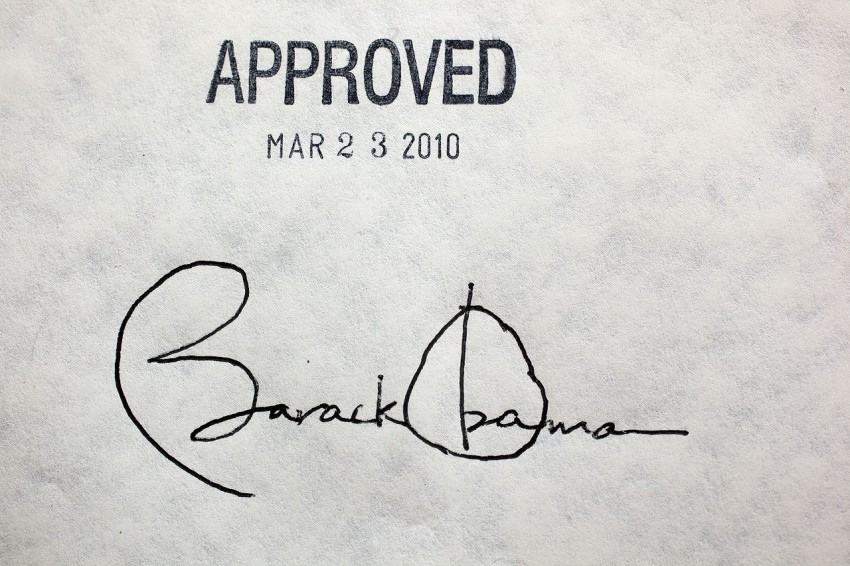By: Gautam Narula
The sheer number of Republican debates has been overwhelming. In 2011, there were 13 major debates—not counting several minor debates and forums, or the abortive Newsmax debate hosted by Donald Trump. The deluge continued with two debates, a mere ten hours apart, held in New Hampshire on January 7 and January 8, just days before the first primary of the election season. In my analysis of the New Hampshire debates, I rank the candidates on how beneficial the debates were to their campaigns on a scale of -10 to 10. The lower the number, the worse the performance. I also comment, analyze, and fact-check some of the statements the candidates made that caught my attention. All poll numbers are an aggregate of various polls as reported by Real Clear Politics.
Newt Gingrich
Debate Performance: -4
New Hampshire Poll: 10.3
National Poll: 17.0
Gingrich’s greatest strength has been his debating skills. His direct, confrontational style, powerful rhetorical technique, and ability to articulately castigate his opponents on TV in front of millions are part of what propelled him to the frontrunner position in late 2011. Although he had slipped in the polls following a spate of negative ads from Romney supporters, the New Hampshire debates provided an important opportunity to regain lost ground. However, Gingrich failed to make much of an impression and failed to go after frontrunner Mitt Romney with his usual zeal. Belatedly, in the second debate, Gingrich confronted Romney about the pro-Romney Super PAC “Restore Our Future”, whose attack ads are widely believed to have deflated Gingrich’s campaign. Romney outfoxed Gingrich in the verbal joust by denying any affiliation with the Super PAC and therefore any responsibility for the accuracy of its ads. He then highlighted all of the truth in the weaknesses in Gingrich’s candidacy that some of the ads had brought up—being forced out of the Speaker of the House position, being fined $300,000 for ethics violations by the House, recording an ad with Nancy Pelosi about the need to take action on global warming, calling Republican Paul Ryan’s proposed budget “right-wing social engineering”, etc. Romney managed to take Gingrich’s assault on unfair attack ads and turn it into a reiteration of Republicans’ deepest fears about a Gingrich candidacy.
Gingrich’s alternate plan of attack was to question Romney’s conservative credentials. Gingrich repeatedly called Romney the “Massachusetts Moderate”, while styling himself as the “Reagan Conservative”. This is curious however because elsewhere in the debate Gingrich noted his ability to “put the country first” and compromise, citing his tenure as Speaker of the House under Bill Clinton. Gingrich also stated that he was better poised to face the billion dollar machine Obama and the Democrats would wield against the Republican nominee, because he offered a “clearer contrast” with Obama than did the relatively moderate Romney, an interesting claim given that most polls say otherwise. Gingrich, rather unusually, opted for veiled attacks on Romney by mentioning New York Times and Wall Street Journal reports that questioned his tenure at Bain Capital and called his tax plan “timid”.
The debate was a failure for Gingrich because by not attacking Romney vigorously, he failed to stop his own freefall in the polls and stop Romney’s post-Iowa momentum.
Notable Quotes:
[In response to a question about his opposition to gay marriage] “The sacrament of marriage…is at the core of our civilization, and is something worth protecting and upholding.”
[To Romney, regarding adherence to time limitations during the debate] “ I realize the red light doesn’t mean anything to you because you’re the front runner.”
Rick Perry
Debate Performance: -2
New Hampshire Poll: 1.0
National Poll: 5.6
Rick Perry’s campaign has never been able to recover from the collapse following his series of poor debate performances last year. While Perry has certainly improved his debating skills, the moderators barely gave him any time to speak and when they did, Perry did little to improve his fortunes. He reemphasized President Obama’s “war on religion” (referencing his tremendously unpopular campaign ad) and his position as a “Washington outsider”. Perry claimed he was the only candidate able to reinvigorate the Tea Party and restore power to the states as a “Tenth Amendment President”, unlike the current “socialist” in power. He also emphasized the need for a part-time Congress. When asked how he would depart from the party line and make conservatives nervous, Perry could only muster his support for cutting spending and a balanced budget amendment. This would make conservatives nervous, Perry argued to an incredulous David Gregory, because so many of them supported big spending in the past. For a man who already shares unfavorable comparisons with George W. Bush, suggesting he would re-invade Iraq if elected President did Perry no favors.
Perry’s performance justified his poor Iowa performance (Perry received only 10% of the vote, when Iowa’s social conservatism should have worked in his favor), and offered little in the way of new ideas (other than the suggested re-invasion of Iraq) that would turn his campaign around. The only reason the debate was not more damaging to the campaign was that little was expected out of Perry anyway.
Notable Quote:
[answering a previously asked question about three areas where Americans would “feel pain” due to spending cuts”] “It would be those bureaucrats at the Department of Commerce and Energy and Education that we’re going to do away with,” [holds up three fingers and grins to other candidates while audience laughs]
Rick Santorum
Debate Performance: +1
New Hampshire Poll: 11.5
National Poll: 16.2
Santorum benefited from significantly more air time in the New Hampshire debates, primarily because he had replaced Newt Gingrich as the not-Romney candidate following his surprisingly strong finish in Iowa (where he trailed Romney by less than .01%). Santorum’s solid debate performance and his momentum will make sure that, for now, he continues to rise in the polls. During the debate, he became embroiled in a back and forth spat with Ron Paul, spending a great deal of time defending himself from accusations of corruption and close ties to lobbyists. Santorum struck back, noting that few of Paul’s measures had ever been passed and that Paul had not accomplished anything of importance while in the Senate. Unfortunately for Santorum, the exchanged distracted from the real task of weakening Mitt Romney.
Santorum, who has repeatedly emphasized Iran as one of the most important foreign policy challenges America has, was asked why Iran was a particularly great threat given our coexistence with a nuclear armed Soviet Union and North Korea. The difference, Santorum argued, was that theocratic Iran (and by extension Islam) had a culture of martyrdom thus there would be little deterrent to using a nuclear weapon. Pakistan was different because it was not a theocracy, and there was “hope for a more secular state” in Pakistan. This secular hope did not extend to the United States, as President Obama, because of his “secular ideology”, had failed to emphasize abstinence and the importance of family, which are the building blocks of society. Santorum reaffirmed his support for the Ryan plan to reform medicare, and stated that while there are different income groups in the United States, American society has no social classes.
Notable Quotes:
[After Ron Paul’s microphone goes off as Paul was criticizing Santorum for being corrupt] “It caught you not telling the truth.”
[On Ron Paul] “The problem with Congressman Paul is, all the things that Republicans like about him he can’t accomplish and all the things they’re worried about, he’ll do Day One,”
Ron Paul
Debate Performance: +2
New Hampshire Poll: 17.5
National Poll: 12.4
The avuncular Ron Paul has a
lways had a small but intensely loyal following for his libertarian views of government and opposition to American interventionism. The New Hampshire debates saw Paul return to his familiar mantra of stripping government down to the Constitution and drastically reducing America’s overseas presence along with heated back and forths, primarily with Rick Santorum.
Paul accused Santorum of corruption and close ties with lobbyists and argued that Santorum’s finances ought to be scrutinized the same way Newt Gingrich’s were. “Entitlements are not rights,” Paul said. The only true right people have is the right to their liberty. In recent weeks, Paul has been dogged by newsletters published decades ago under his name that contained racially offensive material. When questioned about the newsletter, Paul brushed away any implications of racism by noting Martin Luther King was one of his heroes. He noted the disproportionate burden on and discrimination of minorities in military recruitment and criminal justice. Although the response was a dodge of the original probing into the unseemly contents of the newsletter, it was enlightening to hear Ron Paul raise important issues about race and criminal justice in America, such as his mention that minorities were more likely to receive the death penalty.
Overall, Ron Paul had another solid performance, bucking traditional Republican ideology by advocating reduced military spending and closing overseas bases and prescribing the Constitution as the solution to our nation’s ailments. Paul was particularly moving in his emotional anger over politicians sending young men and women to war when they themselves had not served. However, I don’t expect much of a gain in the polls for Paul, mainly because his views are too out of line with the Republican mainstream to garner any support beyond his young, loyal base of followers.
Notable Quotes:
[On what he would do on a Saturday night if he wasn’t running for President] “I’d be with my family. But if they all went to bed, I’d probably read an economic textbook.”
[When confronted with the fact that only one of his 620 proposed measures has actually been signed into law] “Shows how out of touch Washington is with America.”
Jon Huntsman
Debate Performance: +3.5
New Hampshire Poll: 14.5
National Poll: 2.8
Huntsman posted a strong debate performance. He established himself as the reasoned, mature candidate above the partisan politics and petty squabbling that he said had overtaken Washington and the stage. Huntsman argued for decreased oil dependence by exploiting other forms of energy, endorsed the Ryan budget plan, and claimed that by ending all corporate loopholes, deductions, and subsdies, he would trim spending by $1.1 trillion. He repeatedly pointed to his record as Governor of Utah, which under his tenure had posted strong job growth and been named the “Best Managed” state, while under Romney Massachusetts ranked 47th in job growth. Huntsman also delivered his familiar message of the “trust deficit” in America, created because Americans “don’t trust their institutions of power,” be they Washington or Wall Street. This trust deficit would be plugged by instituting term limits on Congress and closing the “revolving door” from elected officials in Washington to lobbying firms. Huntsman continued in this vein in his explanation of serving as Ambassador to China under Barack Obama by stating, “I’ll always put my country first.”
Huntsman’s performance was above his norm, and he was able to maintain the moral high ground when other candidates were busy attacking each other. This is of course much easier to do when, based on your poll numbers, you don’t appear to be much of a threat anyway. He should be rewarded by a modest rise in the polls and perhaps a better than expected New Hampshire performance. At times, however, Huntsman did struggle to assert himself, which has been his perennial problem in debates. Huntsman also erred when, in trying to show that Romney literally did not understand the language of foreign policy, he broke into Mandarin Chinese. An impressive display of linguistic ability to be sure, but not a wise choice when you’re appealing to a base already suspicious of China and not too fond of immigration.
My view of Huntsman’s candidacy is that Huntsman never expected to become the nominee. But by running now, he will get his name out there and become a presumptive candidate for future elections, much like Mitt Romney did after his 2008 election campaign. It isn’t too difficult to imagine Huntsman, who is only 51, running again in 2016 or even 2020.
Notable Quotes:
[In response to Mitt Romney saying that “putting your country first” would not entail enacting Barack Obama’s foreign policy by working for him] “This nation is divided, David, because of attitudes like that.”
[Referring to a previous question about contraception and privacy in the Constitution] “I have seven kids. I’m glad we’re off the contraception question.”
Mitt Romney
Debate Performance: +5
New Hampshire Poll: 37.5
National Poll: 27.0
Throughout this race, the nomination has been Romney’s to lose. The polished Romney has only needed to tread water, both in debates and in the campaign, while other candidates self-destruct. Romney did even better, fending off attacks questioning his conservative credentials and his time at Bain and directly attacking Obama while the other candidates fought amongst themselves. Romney’s campaign message has been centered around his private sector experience, which makes him qualified to reinvigorate the economy and create new jobs. I found this interesting. The determinant of nationwide employment is macroeconomic policy, and related areas of labor, environmental, immigration, welfare, and education policy. Working as a CEO perhaps provides microeconomic job creation experience, but little in the way of the macroeconomic experience needed for managing a nation’s economy. Leading a business does provide valuable experience in administration and management, important skills for a President to have, but after Rick Santorum denigrated the idea of a “CEO-in-Chief”, Romney wisely chose not to mention these qualities. Moderator George Stephanopoulos questioned Romney over his oft-quoted statistic that under his tenure Bain launched companies that created 100,000 jobs, mentioning that some had argued Romney did not include job losses Bain induced, perhaps referring to liberal economist Paul Krugman’s recent New York Times op-ed. Romney asserted that the 100,000 figure accounted both gains and losses. I wish Stephanopoulous had pushed Romney on some of the other questions raised in Krugman’s piece, as Romney’s answers would certainly have clarified much of the Bain issue.
Romney focused on Obama over a slew of issues—attacking big government, Obamacare, Obama’s cutting of the defense budget (though Ron Paul noted these cuts are not as severe as they sound). Romney advocating returning various federal programs, like Medicare and food stamps, to the states. Romney also noted that while he did not discriminate against gays and that they should have equal protection under the law, he believed in a federal amendment defining marriage as a man and a woman. Both Romney and Santorum were careful not to denigrate homosexuality as immoral, leading one correspondent at The Economist to note “The gay marriage issue has been decided when even conservative presidential candidates are careful not to suggest that homosexuality is wrong, but just not the best context for child-rearing”. Romney was able to embarrass both George Stephanopoulos over a poorly worded question about contraception and privacy in the Constitution and Newt Gingrich over his complaint of unfair pro-Romney attacks ads, providing a degree of humanity to a candidate who has frequently been perceived as boring, wooden, and robotic. Romney was able to win rhetorical battles even when he had an inferior argument, such as his repartee with Jon Huntsman following the latter’s correct statement that Romney’s bellicose attitude toward China would lead to a mutually detrimental trade war. Romney’s measured assertiveness made even the moderators hesitant to interrupt.
In one picturesque moment of the debate, Ron Paul and Rick Santorum exchanged heated words while Mitt Romney stood in-between them and smiled. As he saw his opponents bicker among themselves, his grin was that of Barack Obama’s challenger for the President of the United States of America.
Notable Quotes:
[On Barack Obama] “Obama wants to turn us into a European-style welfare state.”
[On his economic credentials] “I understand how the economy works, because I’ve lived in it.”

